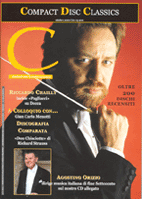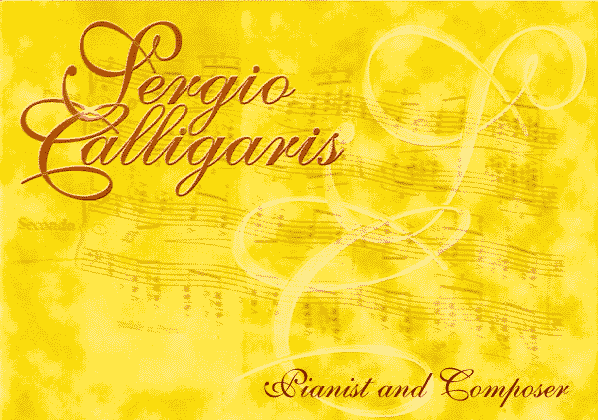 COMPACT DISC CLASSICS, Year 1st - Nr.2
COMPACT DISC CLASSICS, Year 1st - Nr.2
(Music and Media Publishing Ltd - UK)
October 2000 (page 19):
A conversation with... Sergio Calligaris,
by Danilo Prefumo
We talked to the Italian composer at the opportunity of a performance
of a work of him at ĞMilano Classicağ.
In a world full of doubts and uncertainties, in which the crisis of musical languages
(or the musical language tout court…) seems not to leave space between a tired
repetition of formulas already used thousands of times and a radical experimentation
lacking in whatever aesthetic connotation, Sergio Calligaris' music has the ambition and
the will to want to say still something: to say it possibly in a new and articulate way
(sometimes also very articulate), but trying to bring the listener that auditory pleasure
that radicalism forgot and that neo-romanticism, on the contrary, makes banal. To be new
without being needlessly provocative; pleasant without being facile; strictly structured
without falling in empty abstraction: these are the wagers that Sergio Calligaris attempts
to win in each new composition of him, and he loves speaking about with a genuine
enthusiasm which is the natural mirror of his intact trust in the communicative abilities
of music (or, at least, of his music).
- Dear Maestro, again in Milan for a performance of a work of yours…
Yes, "Milano Classica" put on my Toccata, Adagio and Fugue for string
orchestra. That's a work of 1995 with an evident reference to Bach. The work is in fact of
four-party form, opening with an Introduction entrusted to cellos and double basses,
anticipating motifs cues of what will be the Adagio and the Fugue. Toccata, instead, in
form of perpetuum mobile, is a sort of great four voices invention in which I use all
those techniques I love very much, of inversion and augmentation. Adagio molto e
malinconico (Very slow and melancholy) is linked to the first movement by a thoughtful
pattern of cellos and double basses. The Fugue, in four voices, is clearly atonal,
although its harmony intentionally avoids useless and unpleasant dissonances. The main
theme, strongly distinguished in chromatic sense, is resumed and developed in all possible
ways: canon, inversion, augmentation, etc.
- And how did audience welcome your piece?
It was a great success, also thanks to the wonderful performance of the orchestra
"Milano Classica" and Vittorio Parisi, the conductor, who's also dedicatee of
the work. I've been collaborating for many years with Parisi, who conducted almost all
first performances of my orchestral works. It isn't easy that composers and conductors are
nowadays so close. Also because today composers usually don't play as soloists and then
possess less of direct knowledge of practical performing of works. Instead, as you know, I
began my carreer as concert pianist. The composer can't tell everything. What could one do
then with music of Seventeenth and Eighteenth century, in which indications are so few? As
you know, great performers often don't make what the composer indicates. I love, as
pianist, intellectual things: but I let performers the possibility to re-create my
compositions, always following the logic of what I wrote, but mostly their way. And
listening to my works performed in a different way as mine is, for me, a great richness.
Music lives through the performer. You can't do everything literally. If Chopin writes
"piano" in a Mazurka and this "piano" keeps along ten bars, does it
maybe mean that they are ten bars always equal each other?
- In which "tendency" would you place this new work of yours, Toccata,
Adagio and Fugue?
I really care about saying that I'm not a "Neo-Romantic": I don't want to
flatter audience. Neo-romantics, moreover, don't usually use severe forms as I do instead.
I've had an academic training, I graduated on composition in Argentina when I was sixteen
and being in the habit of solving technical and composing problems is almost a second
nature for me. I do want to make communicative music, what's different from being
neo-romantics. You know, who doesn't know the shiver of playing for others, cannot
understand what audience require. Who says not to care about audience, is abstract and few
practical. Who listens has atavistic demands: the need of a certain fineness in rhythm,
melody and form. Music without organization is amorphous. You need to keep organization in
music! My way of viewing things in music obeys to this requirement of knowing what works
with audience.
- You're undoubtedly extrovert…
Yes, I am. I've a communicative and extrovert human nature. I don't write hermetic
music. I'm of Italian origin, but I've a Spanish education, more severe. I therefore try
to communicate in severity. In neoromanticism, with this desire to communicate at all
costs, the speech becomes very simplistic, from the melodic, harmonic and
counterpointistic point of view. I love symmetries, because symmetry means return of
something: return means regularity, and the themes must be re-proposed, so that the
development improves in meaning, because one can remember what was already heard.
- You're one of the most performed contemporary composers…
Yes, and I'm very proud of it. Many musicians love my music and often perform it. For
instance, duet Mormone-Krilov frequently play my Double Concerto op.37. I don't promote my
music: it's performers who love it. I also can tell you that on October 29th, at Orfeo
Theatre of Taranto, the Orchestra della Magna Grecia - of which Vladimir Ashkenazy is
honorary Chairman - and the brilliant piano duet Fabio e Sandro Gemmiti, dedicatee of this
work, will perform my Double Concerto op.41 for two pianos and big orchestra, first world
performance: the conductor will obviously be Vittorio Parisi. It's a work I really care
about, commissioned by the Magna Grecia Orchestra and which will represent Italy in Japan
in 2001 for the cultural twinning Italy-Japan. At Pontino Festival, moreover, Vladimir and
Dimitri Ashkenazy will perform my Sonata op.38 for piano and clarinet, first world
performance, of which they're dedicatees. Besides, I've just completed my Ave Verum op.42
for mixed choir or voice quartet and piano, which will be soon performed in Milan. This
work will be also published in a version for piano solo. It's a work I wrote last summer
in Rocca di Mezzo, Abruzzo, a charming place that I love very much and from which I've
drawn inspiration for my composition for the last 12 years.
Danilo Prefumo

